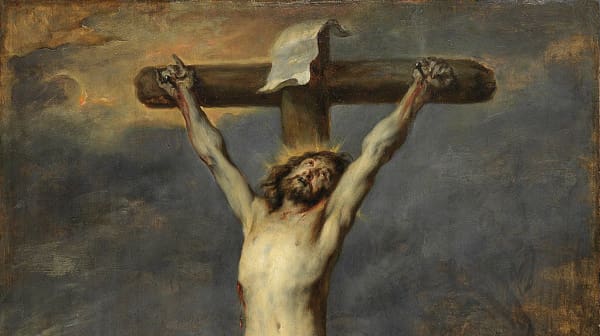We enter another Holy Week. Jesus’ hour has come. Although he begs his Father to allow the cup of suffering to pass, in the end Jesus freely and willingly plunges into his Passion for our sake. He drinks the cup to the dregs, descending fully into the depths of human misery, indeed into the very hell that our misused human freedom has “created.”
I love this quotation from Charles de Foucauld (taken from André Daigneault’s The Way of Imperfection):
“All his life, Jesus only descended: descending in his incarnation; descending in becoming a small child; descending in obedience; descending in becoming poor, abandoned, persecuted, tortured; descending in reaching the last place.”
All this descent of Jesus is “for our sake” – as we profess in the Creed. He desires to redeem us and save us. The redemption he brings is so much more than standing in our place and paying the price on the Cross. Some Christians have a rather narrow or distorted view of atonement that almost paints God as a vengeful and petty deity whose wrath can be appeased only by blood. Jesus reveals our Father to be eternally kind. To be sure, there is a great sense of justice in Jesus paying the price, but that standing in our place says much more about God fully respecting the gift and dignity of human freedom (and its real consequences) than it says about him being in any way demanding.
Jesus tells us why he has come from heaven “for our sake” – to seek out and save what is lost (Luke 19:10). I wrote last time about the great dignity of our human nature, even after the fall. We all have deep and dark places in our hearts in which we feel broken and shattered, marred and disfigured, unlovely and unlovable. Jesus reveals to us that there is no place too deep or too dark for him to enter. His desire to descend is unlimited – or rather, limited only by our resistance to receiving him.
There is so much that is comforting in this message. Jesus is not deterred by how seriously and how often each of us has turned our backs on him. He prays for his persecutors. He does not flinch when his closest companions misunderstand him, abandon him, deny him, or betray him. At Peter’s third denial, Jesus turns toward him with a gaze of kindness that incites Peter to rush outside and shed bitter tears.
The deeper truth of Holy Week is that Jesus desires to descend fully and deeply into the worst of our human experiences in order to rescue us, heal us, transform us, and exalt us. Hebrews 5 tells us that Jesus not only offered prayers and supplications for us, but did so with louds sobs and tears. It was not simply a matter of paying a price. Rather, he freely and willingly united himself with every human experience of misery and suffering – every loss, every betrayal, every rejection, every abandonment, every single moment of darkness. Jesus descended.
Philippians 2 describes the dynamics. Jesus, though truly divine, freely chooses to descend, to empty himself completely and totally for our sake. He is therefore exalted and raised above every other creature. He does this, not for his own glory and exaltation (he had no need of it!), but “for our sake” – in order that where he is, we also may be (John 14:3).
Nor does Jesus descend in order to rescue and exalt the “good” people or the “good enough” people. We are all the lost sheep, the lost coin, his lost sons and daughters. Remember whom he chose to hang around with the most – the poor, the lame, the crippled, and the outcasts – including those considered to be the worst of sinners.
I know in my own life I have often vacillated back and forth between a puffed-up confidence (as though I “have it all together”) and deep discouragement. In both cases, I am somehow trying to be my own savior. Meanwhile, I need only allow Christ to complete his descent into the places of my heart in which I feel the most desperate and discouraged, and his love begins to transform all.
True Christian humility always brings with it a twofold conviction: (1) My own radical poverty; and (2) unshakable confidence in God’s eternal mercy. This is the humility we see in the Virgin Mary and her Magnificat – her song of praise to God in the presence of Elizabeth (Luke 1:46-55). She deeply understands that all is gift, proclaiming God as her savior – AND she eagerly praises the amazing things he is doing in her and through her, so great that all generations henceforth will call her blessed.
At the Cross, Mary freely shares in the sufferings of her Son, having compassion not only on him, but on every lost child of God who stands in need of mercy. Her Son loves us, and therefore so does she. The fact that many of us keep messing things up does not for a moment cause him to falter in his descent, nor her to falter in her deep motherly compassion on those who suffer with her Son.
How many of us attempt (in our prayers or piety) to try to “go up” to God? How willing are we to be truly vulnerable, to let him see us fully, and to love us where we most need his love? Do we not sometimes take the lead of Adam and Eve in the fall, hiding ourselves from God and covering our nakedness? Toxic shame is one of the devil’s favorite tools to convince us that no one would ever love us as we are.
The descent of Jesus says otherwise. He desires every piece and fragment of our broken hearts. There is no limit to his desire to descend.




